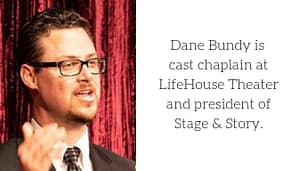
Wayne R. Scott with Dane Bundy
In this series, we look at the current LifeHouse Theater production through the lens of the Christian perspective.
Unlike other productions that we’ve looked at in this series, such as “My Fair Lady” and “Phantom of the Opera,” our featured musical is based upon the writings of a committed Christian, John Bunyan. This man was so dedicated to Christ that he soon found himself in jail. Why? Without permission from England’s established church, Bunyan was preaching the gospel.
Confined within the jail walls, and now with a great deal of free time, Bunyan penned one of the best-selling and most widely read books of all time, Pilgrim’s Progress.
As Advertised
Perhaps my favorite part of LifeHouse’s adaptation of Bunyan’s work is how it’s framed: it is a stage play within a stage play! As soon as the curtain opens, we see that not only does this creative choice help the audience identify the many characters on stage, but it provides John Bunyan (the character in the play) with a clever defense.
When the Constable accuses Bunyan of trying to cause trouble with his gospel-preaching, Bunyan responds that he’s only trying to promote the arts, or in his words, “[T]o introduce my troupe of traveling actors for the mere purpose of performing a story–a harmless story! As advertised!”
And it works! The Constable has lost his grounds to arrest him, for Bunyan is simply telling a story. Eventually, the Constable is so drawn into the fictional world they’ve created that he pleads for them to continue so he can know how the drama resolves.
Watchful Dragon
This reminds me of C.S. Lewis who in his work On Stories explains that storytelling can allow a man to sneak a message past a watchful dragon. While preaching may be like poking the dragon with a stick, telling a story is like lulling the beast to sleep with a spell, allowing that messenger to walk right past.
You may remember that Nathan the prophet uses the same approach with David (2 Samuel 12). Instead of confronting David explicitly with his sins of adultery and murder, Nathan tells David a story of a wealthy man who stole a poor man’s only lamb. Infuriated, David calls for this man’s death! Nathan responds: “You are that man!”
Nathan’s story has lulled David to sleep, lowering his defenses, implanting the rebuke in his heart. Did it work? Yes! David repents and then writes one of his most well-known Psalms: chapter 51.
Wash me thoroughly from my iniquity,
and cleanse me from my sin!
For I know my transgressions,
and my sin is ever before me.
Today is no different, stories continue to carry with them the same sneaky power. We hear stories all the time of men and women who refuse to attend a church service but will come and see a play at LifeHouse.
So often, just like the man and the dragon, Nathan and David, the Constable and Bunyan, a LifeHouse guest will enter the theater with fortified walls only to have them crumble when they encounter the story from the stage.
At LifeHouse we do not function as a church and we are not preachers, but we are storytellers, messengers sneaking past watchful dragons.
What About You?
What production at LifeHouse has stolen past your defenses? I’d love to hear your story.



While The Pilrgrim’s Progress remains my favorite story outside of the Bible—perhaps because it is composed of so much Bible, Man of La Mancha is one of my LH favorites, and illustrates your point of play about a story within a story! Absolutely brilliant.
The life of King David broke me down in the best way. I was a sobbing mess of a person and I needed it in that moment. ❤️
I love this article. It explains everything perfectly. I’m so glad your’e doing Pilgrims Progress right now. The way the world is existing on what its being told, this actually tells them the truth. Its a very powerful message. God continue to bless you, ~Marcie